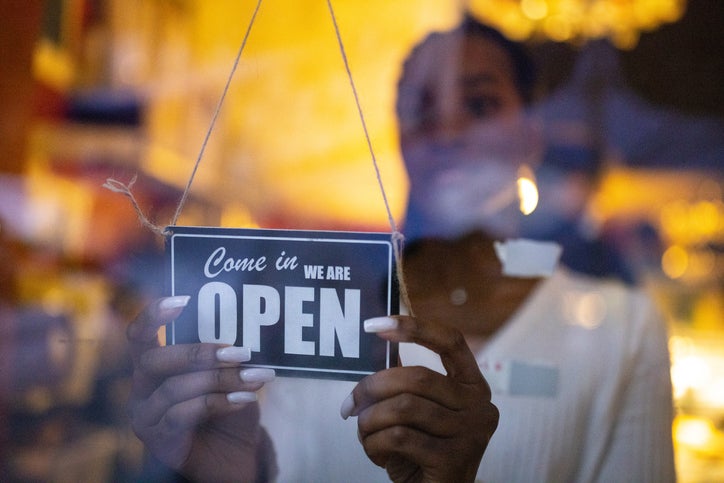Luis Alvarez/Getty Images
Key takeaways
- Maximum interest rates for bad credit business loans can range from 25.00 to 99.00 percent, unless you’re able to get an SBA loan
- Factors that influence bad credit business loan rates include cash flow, credit score, the current market, the lender and time in business
- When comparing bad credit business loans, pay attention to the APR or factor rate, fees, loan amount and repayment terms.
Maximum interest rates for bad credit business loans run anywhere from 25 percent to 99 percent unless you’re able to get an SBA loan. SBA loans are backed by the U.S. government, allowing lenders to offer lower rates. However, it’s not possible to give an average rate for bad credit business loans because interest rates vary widely based on the lender, the market and your credit profile.
Let’s dig into common business loan interest rates for bad credit loans and lenders.
As a bad credit borrower, you probably won’t qualify for a lender’s lowest interest rates. And many types of bad credit business loans use factor rates, which can significantly increase your borrowing costs. So, pay attention to the upper range of interest that a lender offers.
Maximum rates that you might see for different types of bad credit business loans:
| Loan type | Average maximum rates |
|---|---|
| Term loans | Interest rate: 75.00%+; Factor rate: from 1.10 |
| Business lines of credit | Interest rate: 60.00%+ |
| Equipment loans | 25% to 35% interest |
| SBA loans | Fixed rate: 13.50% to 16.50% Variable rate: 11.50% to 15.00% |
| Invoice factoring/financing | 0.5% to 4% factoring rate |
| Merchant cash advances | Factor rate: 1.04 to 1.30 |
Bankrate tip
A factoring rate is a fee specific to invoice factoring. It’s a percentage that gets applied to the invoice amount once the invoice is paid. Many factoring companies charge tiered rates that go up after a specific time, like 10 or 30 days. In some cases, companies charge an additional daily rate on the amount advanced to you. Be sure to look closely at the fees charged when considering invoice factoring or financing.
The following factors can influence the interest rate for your bad credit business loan:
- Cash flow. Having plenty of revenue or cash on hand shows financial stability and could lead to lower interest rates than if you operate with tight profit margins.
- Credit score. Your exact score will influence how risky the lender views you. When using a personal credit score, many lenders will work with credit scores of 600 or higher. A score in the 500s will provide limited options. And while low, a business credit score of 49 is better than 20.
- Current market. If the credit environment tightens for economic reasons, lenders favor less risky borrowers and deny more bad credit applicants than they would in a robust economy.
- Lender. Some lenders specialize in loans for bad credit borrowers, while others keep lending to this group at a minimum. It all depends on the balance a lender wishes to keep with its loan portfolio.
- Time in business. If your business credit has only dipped recently due to unforeseen circumstances, a lender may take your favorable payment history into account.
- Unsecured or secured loan. Promising business assets to back the loan reduces risks for the lender if you default. For this reason, lenders may lower interest rates for secured loans over unsecured loans.
Since interest rates and fees are already high even for the best bad credit business loans, stay vigilant when comparing the key features of loans. What to look for:
- APR. Business loans usually show an annual percentage rate, which reflects the annual cost of the loan, including some fees.
- Factor rate. Some loans charge a factor rate instead of an APR, multiplying the entire loan amount by a factor like 1.10 or 1.50. Factor rates don’t include fees and often translate into a higher APR than loans that charge interest traditionally.
- Fees. You’ll run into these common business loan fees, plus a few that are specific to loan alternatives that cater to bad credit businesses.
| Fee | What it’s for |
|---|---|
| Closing fee | Charged by some lenders to finalize the loan contract |
| Discount fee or factoring rate | An invoice factoring fee that charges a percentage of the unpaid invoices as a one-time, weekly or monthly cost |
| Late payment fee | Charged when you miss a loan repayment to restore the loan to good standing |
| Origination fee | Fee for initiating the loan and reviewing the loan application |
| Prepayment penalty | Fee charged when the business pays the loan in full ahead of the repayment schedule |
| Termination fee | Charged for closing an invoice factoring or merchant cash advance account |
- Loan amount. Lenders tend to offer lower loan amounts to bad-credit borrowers. If you need a higher loan amount, like $250,000 or $500,000, you’ll have to find a lender willing to lend you that amount.
- Repayment terms. You may need to repay the loan on a short timeline, such as six to 24 months.
SBA loans for bad credit
Some lenders offer affordable SBA loans for bad credit. Lenders like Lendio and Creditfy only require a credit score of 600 to apply for an SBA loan. There are also types of SBA loans that are meant to help borrowers with bad credit or underserved communities:
Loan cost examples
To find the most affordable loan, shop around and compare interest rates, total costs and repayment terms. Keep in mind that some bad credit loans use factor rates. This is a fixed cost that doesn’t change even if you repay the loan early.
Use these examples or our business loan calculator to get an idea of how much you’ll pay.
| Loan amount | APR or factor rate | Repayment term | Monthly payment | Total interest |
|---|---|---|---|---|
| $100,000 | 36% APR | 5 years | $3,613.30 | $116,797.75 |
| $100,000 | 50% APR | 2 years | $6,671.08 | $60,105.86 |
| $100,000 | 1.50 factor rate | 2 years | $6,250, not including fees | $50,000 |
Lenders set their own standards for how much risk they’re willing to take when lending to business owners with bad credit. See how the features and interest rates change across the market, depending on the type of loan.
Term loans
Bad credit term loans often come with smaller loan amounts and short repayment terms. Compare these lenders that cater to bad credit borrowers.
| Lender | Interest rates | Details |
|---|---|---|
| Fora Financial | Not stated | Loan amounts from $5,000 to $1.5 million Terms up to 16 months No collateral required |
| National Funding | From 1.10 factor rate | Loan amounts from $5,000 to $500,000 18-month terms |
| OnDeck | 52.60% to 60.90% average APR | Loan amounts from $5,000 to $250,000 12- to 24-month terms Funding as quick as same day |
| Paypal | Flat fee, undisclosed | Loan amount from $5,000 to $150,000 17- to 52-week terms Weekly payments |
| Taycor Financial | 1.10 to 1.40 factor rate | Loan amounts from $10,000 to $1 million 4- to 60-month terms Personal guarantee required |
| Triton Capital | 8.99% to 74.99% | Loan amounts from $10,000 to $250,000
6 – to 36-month terms |
Business lines of credit
Business lines of credit tend to come with lower loan amounts than other loans, especially if your business has a risky credit history. See the features on business lines of credit from these bad-credit lenders.
| Lender | Interest rates | Details |
|---|---|---|
| Bluevine | From 6.20% simple interest | Loan amounts up to $250,000 6- to 12-month terms No origination or prepayment fees |
| Credibly | Not disclosed | Loan amounts up to $300,000 Funding as quick as same day |
| Fundbox | Weekly fee from 4.66% | Loan amounts from $1,000 to $150,000 12- to 24-week terms |
| Lendio | 8.00% to 60.00% | Loan amounts from $1,000 to $500,000 6- to 18-month maturity date Accepts startups |
Equipment loans
Your business may qualify for equipment loans with higher loan amounts and longer terms since this is a secured type of loan. Some lenders also offer flexible repayment schedules, such as quarterly or seasonally.
What you can expect to find on the market:
| Lender | Interest rates | Details |
|---|---|---|
| SMB Compass | From 5.99% | Loan amounts from $25,000 to $5 million Terms up to 10 years |
| Taycor Financial | 3.49% to 28.00% | Loan amounts from $500 to $2 million 12- to 84-month terms No down payment required Flexible repayment schedule |
| Triton Capital | 5.99% to 24.99% | Loan amounts from $10,000 to $500,000 12- to 60-month terms Funds in as little as 1 day Preapprovals good for 90 days |
| National Funding | From 4.99% simple interest | No down payment required Loan amounts up to $150,000 24- to 60-month terms |
Invoice factoring or financing
Invoice factoring allows you to sell your outstanding invoices to a factoring company that will collect the invoices in exchange for fees. Invoice financing uses the outstanding invoices as collateral to fund a loan, which you pay back as clients pay the invoice.
Not all lenders offer invoice factoring or financing, so look at the key features for a few lenders with this product.
| Lender | Fees | Details |
|---|---|---|
| Credibly | 1.11 factor rate | Advances up to $400,000 Funding in as little as 24 hours |
| Lendio | 3.00% fee | Terms up to 1 year Advances up to 90% of unpaid invoices |
| SMB Compass | From 12.00% interest rate | Loan amounts from $25,000 to $10 million Funding as quick as 24 hours |
Merchant cash advances
Merchant cash advances (MCA) provide an advance of funds that you repay with future debit or credit card sales. This type of loan comes with lenient eligibility criteria but typically a shorter time to repay.
See what these lenders offer with their MCAs.
| Lender | Factor rates | Details |
|---|---|---|
| Credibly | Factor rate from 1.11 | Advances up to $400,000 3- to 15-month terms |
| Lendio | Factor rate from 1.08 | Advances $5,000 to $2 million Terms up to 2 years |
| Fora Financial | Not stated | Advances $5,000 to $1.5 million 6-month time in business Funds within 24 to 72 hours |
Bankrate insight
Bottom line
Interest rates on bad credit business loans commonly range from 25 percent and upward, though it depends on your exact credit risk. While your credit score matters, different factors can offset the risk, such as having strong revenue, collateral or a previous history of on-time payments. Be sure to consider different lenders’ interest rates, fees and repayment terms to determine whether you’re getting an ideal offer.
-
Yes, you can qualify for a business loan with bad credit. However, you need to find a lender that accepts credit scores below 600, and you may need collateral or a personal guarantee to ease the lender’s risk. It’s also harder to get a loan in an economic downturn because lenders tighten criteria to avoid risky borrowers.
-
A business line of credit works well for businesses with bad credit because the lender will set a credit limit according to your risk level. It then gives you a chance to establish a positive credit history. Secured business loans are also easier to qualify for since the loan is backed by business assets.
-
It’s possible to get a startup business loan with bad credit as long as you meet the lender’s minimum requirements. Lenders who accept startups tend to have more lenient criteria, such as a credit score of 500 to 600 and at least six months in business. Online lenders, SBA lenders and community development financial institutions (CDFIs) may be more willing to accept bad-credit borrowers.
Read the full article here
 Trending:
Trending:















